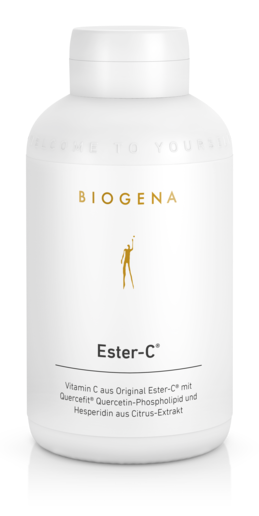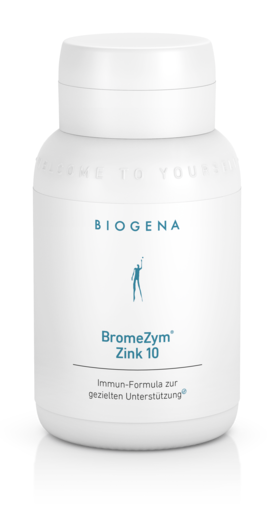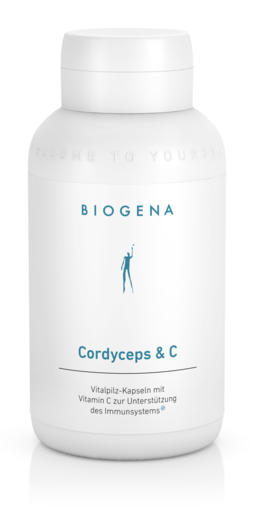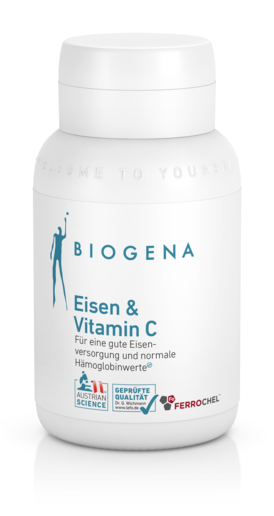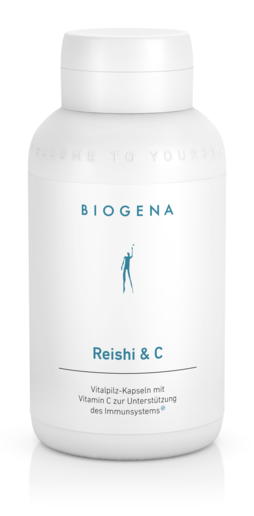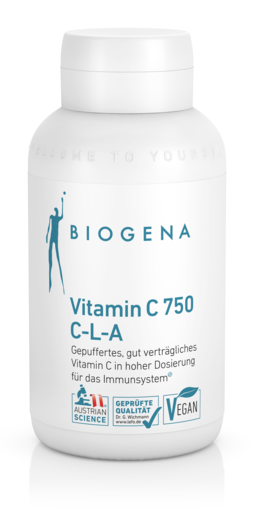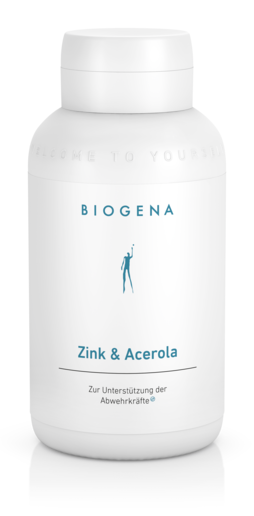Vitamin C (ascorbic acid)
If you want to make sure your body has enough vitamin C during the cold season, you should definitely integrate plenty of fresh fruit and vegetables into your diet. Vitamin C fulfils numerous indispensable tasks in the body. For example, vitamin C can strengthen the immune system and is involved in numerous metabolic processes. That’s why it’s important to cover your daily needs, but it’s not always easy. Sometimes, foods that do not contain sufficient vitamin C are consumed, and at other times people have an increased need. To avoid a deficiency, high-quality dietary supplements are available that can help cover the requirement.


Buy Vitamin C Supplements online at BIOGENA
BIOGENA offers a wide range of different vitamin C supplements, which can be purchased both at BIOGENA Premium Stores and from our online shop. Whether you’re looking for plant-based vitamin C, high-dose or liposomal vitamin C, the BIOGENA collection has the perfect products to meet all your vitamin C needs.
One thing that all BIOGENA vitamin C supplements have in common is their top quality and intrinsic value. This is hardly surprising, since each supplement contains all the experience, intuition and concentrated expertise of the BIOGENA scientific team, which is over 20-strong.
Making zero compromises when it comes to quality, BIOGENA has earned the right to call itself "premium". This begins with science-based recipe development, continues with the best raw materials sourced from around the globe and ends with the strictest quality control testing for each individual batch, which goes far beyond the standard requirements. It’s not a coincidence that each of our products is labelled with test and quality seals.
Wherever possible, unnecessary additives such as preservatives, emulsifiers, binding and separating agents, synthetic colourings or synthetic coating agents are avoided in the manufacture of our supplements. This means that BIOGENA vitamin C preparations are also perfect for those with sensitivities.
Vitamin C – very important for health
Vitamin C is involved in numerous processes in the body. It supports well-being and can improve vitality. The body needs vitamin C, which must be supplied to it daily, as it cannot produce it, for the formation of protein molecules, which are in turn required for many things, such as:
Vitamin C and collagen formation
In terms of wound healing and collagen formation, according to the EFSA (European Food Safety Agency), the following statements regarding vitamin C are admissible:
Vitamin C contributes to the normal creation of collagen and the normal functioning of the blood vessels.
Vitamin C contributes to the normal creation of collagen and the normal functioning of the skin.
Vitamin C contributes to the normal creation of collagen and the normal functioning of the bones.
The protein collagen (extracellular structural protein) is the basis for the elasticity and strength of the connective tissue, which makes up 25 to 30% of the protein of animals and humans.
Vitamin C and immune defenses
There are also advertising statements that may be made regarding the role of vitamin C in the function of the immune system:
Vitamin C contributes to normal energy metabolism.
Vitamin C contributes to the normal functioning of the immune system.
Vitamin C helps protect the cells from oxidative stress.
Oxidative stress, a harmful state of the metabolism, is associated with an accelerated aging process. It occurs due to the formation of too many free radicals, which are very reactive oxygen compounds. In the case of oxidative stress, there are not enough antioxidants available to break them down. These free radical scavengers react with the harmful free radicals and can thus protect the body cells from oxidation. It is therefore important to take in enough foods containing vitamin C. The possible symptoms of oxidative stress are:
Fatigue and exhaustion.
In the case of a deficiency, performance often decreases.
More infections may occur.
Vitamin C is needed for:
Vitamin C helps to strengthen the immune system.
Vitamin C is also required for:
Manufacture of collagen that plays a role in almost all organs and tissue structures
Energy metabolism
Nerves and mind
Regulation of oxygen supply to body cells
Improved iron absorption
Protection of cells against oxidative stress (free radicals)
What happens in the case of a vitamin C deficiency?
If the body has too little vitamin C available for a longer period, various symptoms of deficiency may occur. This was the case until the 18th century for many seafarers who were only fed preserves and had no fresh fruit or vegetables for months. Possible symptoms include:
Weakness and exhaustion.
In addition, skin signs, such as wrinkles, may appear.
This means that the immune system is weakened.
Increased vitamin C deficiency is associated with mood swings.
Protect against vitamin C deficiency
The recommended daily intake of micronutrients, including vitamin C, varies between the recommended authors and institutes. To meet daily needs, the DGE recommends that adults take a dose of 100 mg per day. However, nutrition experts consider this value to be significantly too low and recommend a higher intake. An overdose is not possible because any excess vitamin C is excreted by the body. It should therefore be consumed regularly throughout the day.
There are groups of people such as smokers and pregnant women who have a higher vitamin C requirement. To avoid a deficiency, it is important to recognize the symptoms mentioned at an early stage. A deficiency is caused by the following:
Consumption of too little fruit and vegetables
Regular nicotine and alcohol consumption
Pregnancy
High stress
Athletes
The following foods have a fairly high vitamin C content:
Tomatoes
Peppers
Sauerkraut
Cabbage
Citrus fruits
Sea buckthorn
Rosehips
Acerola cherry
Blackcurrants
Kiwi
Papaya
Melon
Vitamin C as a dietary supplement
The body needs it daily in sufficient quantities, but cannot produce it and can only store it in small amounts. Vitamin C must therefore be supplied regularly via your food. In certain life situations, the need may be increased, for example in the case of regular nicotine consumption or intensive training. In this case, dietary supplements can help to avoid a deficiency. To prevent symptoms of deficiency, it may be necessary to increase consumption, for example in the form of dietary supplements. These are recommended if the additional need for nutrition cannot be completely covered or a deficiency has been determined. Our body cannot distinguish whether the vitamin C provided to it is natural or artificially produced. Of course, a diet with plenty of fruit and vegetables is always preferable to taking supplements, but both variants are absorbed well by the body.
Tablets, capsules, effervescent tablets, powders and liquids – the dosage options
Anyone looking for a vitamin C supplement online will come across an impressive variety of products. Not only is the number of products diverse, but also the forms of dosage. From vitamin C tablets to capsules, effervescent tablets, gummies, powders, liquids – and more.
When it comes to vitamin C, many people choose capsules or tablets, which are practical, have a neutral flavour and are easy to take. While tablets often contain a number of additives for production purposes, capsule products usually contain no unnecessary additives.
For those who find swallowing tablets difficult, or for those who prefer a flavoured product, vitamin C is also available in effervescent tablets, powder or liquid form. However, it’s important to keep a watchful eye on the ingredients for these products. The fewer additives, the better.
It’s all in the connection: Ascorbic acid
Approved compounds for vitamin C supplements are various ascorbates: L-ascorbic acid, calcium L-ascorbate, zinc L-ascorbate, potassium L-ascorbate, sodium L-ascorbate, magnesium L-ascorbate, fat-soluble ascorbyl palmitate, and Ester-C®. The patented vitamin C compound Ester-C® has several advantages. Studies show a longer and thus slower absorption time. In addition, it is not acidic and thus well tolerated in the stomach.
What is the best way to take Vitamin C?
Right now, Liposomal vitamin C is unbeatable in terms of absorption capacity. In this innovative compound, the water-soluble vitamin C is not present in free form, but is instead encased in a protective shell of phospholipids. This results in improved absorption into the body. According to studies, taking liposomal vitamin C results in a 2.4 times higher vitamin C level in the blood than with conventional vitamin C powder.
The vitamin C in the branded raw ingredient Ester-C® also offers good bioavailability. It is based on a proven complex consisting of stomach-friendly vitamin C and the vitamin C metabolite L-threonate. Studies show that Ester-C® remains in the immune cells for longer than normal vitamin C.
How is vitamin C best tolerated?
Buffered vitamin C is considered to be particularly well tolerated – unlike pure vitamin C (= L-ascorbic acid), which can cause problems, especially for people with gastrointestinal sensitivities. With buffered vitamin C, the acid is bound with the help of an alkaline mineral (e.g. calcium). This results in an almost pH-neutral vitamin C that is much gentler on the teeth and stomach. Calcium ascorbate (Ester-C®) or liposomal vitamin C are good examples of very well-tolerated vitamin C.



